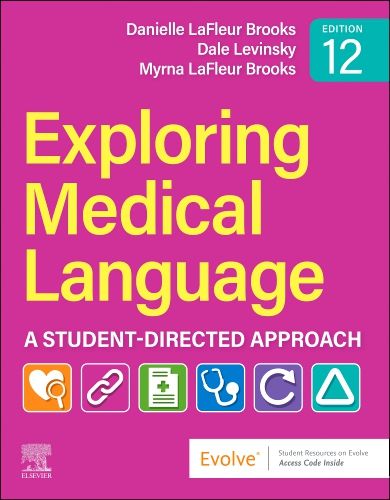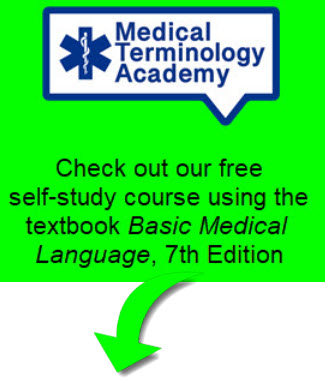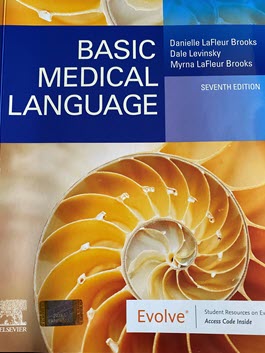Medical Terminology Sample Syllabus

Perhaps your college is offering a medical terminology course for the first time – you are the instructor and need to create a syllabus. Or, maybe you have been teaching medical terminology for years and want to revamp your current syllabus.
Whatever the reason, creating a medical terminology course syllabus is on your list of things to do.
The sample syllabus below may be just the thing you are looking for to help you.
Keep in mind that a syllabus is an effective map of the course’s nuts–and–bolts logistics, and also an invitation to actively engage the students in the learning process.
It sets the tone for the course, one that emphasizes what the student can do rather than what they can NOT do.
Medical Terminology Course Syllabus
Basic Course Information
Course Information
Name of Course: fill in the course title
Location: fill in building and room number where the class meets
Credits: 3 (48 hours)
Day/Times: fill in day(s) and time
Semester Dates: Meets 15-16 weeks fill in dates
Faculty Information
Faculty: fill in name | View Faculty Credentials insert link
Office Location and Office Hour(s): fill in the information
Email: fill in Tel#: fill in
Course Description
This course introduces students to the language of medicine. Word building, analyzing, and defining exercises are used to learn medical terms built from word parts. Memorizing and recalling are used for medical terms not built from word parts. Spelling, pronunciation, and practical application is emphasized. Students will learn to use and understand medical terminology and the word parts used to build words in simulated real-world contexts.
Prerequisites: None
Course Competencies
Roman Numerals at the end of each competency refers to the Roman Numerals in the Course Outline, matching the outline with the Course Competencies.
- Describe the origin of medical terms. (I)
- Define the four word parts and the combining vowel. (I)
- Build, analyze, and define medical terms using word parts. (I)
- Describe organizational components of the body, directional terms, anatomic planes, regions, and quadrants. (II)
- Identify the major body system structures and their related word parts. (III)
- Define medical terms related to diseases and disorders. (III)
- Define diagnostic terms for each body system. (III)
- Identify plural endings for medical terms. (III)
- Define surgical terms related to each body system. (III)
- Define medical terms commonly used in obstetrics and neonatology. (IV)
- Define medical terms used in oncology. (V)
- Recognize common abbreviations used in each body system and specialty area. (V)
- Pronounce medical terms. (V)
- Spell medical terms. (V)
Course Outline
I. Introduction to Medical Terminology
A. Origin of medical terms
1. acronym
2. eponym
3. word parts
4. modern language
B. Word parts
1. word root
2. prefixes
3. suffixes
4. combining vowel
5. combining form
C. Use of word parts
1. analyzing
2. defining
3. word building
II. Body Structure
A. Body organization
B. Anatomic planes
C. Abdominopelvic regions
D. Body Positions
E. Abdominopelvic quadrants
F. Directional terms
III. Terminology for Body Systems
A. Anatomic terms
B. Word parts
C. Disease and disorder terms
D. Surgical terms
E. Diagnostic terms
F. Abbreviations
G. Pronunciation
H. Spelling
I. Plural endings
IV. Obstetrics and Neonatology
A. Anatomic terms
B. Word parts
C. Disease and disorder terms
D. Surgical terms
E. Diagnostic terms
F. Abbreviations
G. Pronunciation
H. Spelling
V. Oncology
A. Body structure
B. Word parts
C. Disease and disorder terms
D. Surgical terms
E. Diagnostic terms
F. Abbreviations
G. Pronunciation
H. Spelling
Course Materials and Requirements
TEXTBOOK: LaFleur Brooks and LaFleur Brooks: Exploring Medical Language, 10th ed., Elsevier/Mosby
Online assignments and materials will require a computer and an internet connection.
Use Medical Terminology Blog as a resource for learning medical terms.
Evaluation and Assessment
Three examinations will be used to evaluate learning and to issue a grade. Students are expected to complete class assignments prior to each class. Each examination will count for one-third of the final grade. (An option is for each of the three assessments to be worth 25% of their final grade and make completing textbook exercises throughout the semester worth 25% to encourage the students to practice!) No more than three unexcused absences will be allowed. Make-up tests and extra credit may be arranged with the permission of the instructor.
A 89-100
B 79-88
C 69-78
Course Schedule
Week One
Chapter 1: Introduction to Medical Language and Evolve Student Resources
Assignment: Complete all Chapter 1 paper and Evolve (online) Exercises
Week Two
Chapter 2: Body Structure, Color, and Oncology
Assignment: Complete all Chapter 2 paper and Evolve (online) Exercises. Practice with paper or electronic Flashcards
Week Three
Chapter 3: Directional Terms, Planes, Positions Regions and Quadrants
Chapter 4: Integumentary System (3 hrs)
Assignment: Complete all Chapter 3 and 4 paper and Evolve (online) Exercises. Practice with paper or electronic Flashcards. Interview a Health Professional.
Week Four
Chapter 4: Integumentary System (cont’d)
Chapter 5: Respiratory System and Introduction to Diagnostic Procedures and Tests (3 hrs)
Assignment: Complete all Chapter 5 paper and Evolve (online) Exercises. Practice with paper or electronic Flashcards. Suggest using Evolve online chapter quizzes to prepare for next week’s exam
Week Five
Chapter 5: Respiratory System and Introduction to Diagnostic Procedures and Tests (cont’d)
Chapter 6: Urinary System (2 hrs)
Assignment: Complete all Chapter 6 paper and Evolve (online) Exercises. Practice with paper or electronic Flashcards
EXAM Chapters 1-5
Week Six
Chapter 6: Urinary System (cont’d)
Chapter 7: Male Reproductive System (2 hrs)
Assignment: Complete all Chapter 7 paper and Evolve (online) Exercises. Practice with paper or electronic Flashcards
Week Seven
Chapter 8: Female Reproductive System (3 hrs)
Assignment: Complete all Chapter 8 paper and Evolve (online) Exercises. Practice with paper or electronic Flashcards
Week Eight
Chapter 9: Obstetrics and Neonatology (3 hrs)
Assignment: Complete all Chapter 9 paper and Evolve (online) Exercises. Practice with paper or electronic Flashcards
Week Nine
Chapter 10: Cardiovascular, Immune, Lymphatic Systems and Blood (5 hrs)
Assignment: Complete all Chapter 10 paper and Evolve (online) Exercises. Practice with paper or electronic Flashcards. Suggest using Evolve online chapter quizzes to prepare for next week’s exam
Week Ten
Chapter 10: Cardiovascular, Immune, Lymphatic Systems and Blood (cont’d)
Chapter 11: Digestive System (4 hrs)
Assignment: Complete all Chapter 11 paper and Evolve (online) Exercises. Practice with paper or electronic Flashcards
EXAM Chapters 6-10
Week Eleven
Chapter 11: Digestive System (cont’d)
Week Twelve
Chapter 12: Eye (2 hrs)
Chapter 13: Ear (2 hrs)
Assignment: Complete all Chapter 12 and 13 paper and Evolve (online) Exercises. Practice with paper or electronic Flashcards
Week Thirteen
Chapter 13: Ear (cont’d)
Chapter 14: Musculoskeletal System (3 hrs)
Assignment: Complete all Chapter 14 paper and Evolve (online) Exercises. Practice with paper or electronic Flashcards
Week Fourteen
14: Musculoskeletal System (cont’d)
15: Nervous System and Behavior Health (3 hrs)
Assignment: Complete all Chapter 15 paper and Evolve (online) Exercises. Practice with paper or electronic Flashcards
Week Fifteen
Chapter 15: Nervous System and Behavior Health (cont’d)
Chapter 16: Endocrine System (2 hrs)
Assignment: Complete all Chapter 16 paper and Evolve (online) Exercises. Practice with paper or electronic Flashcards. Suggest using Evolve online chapter quizzes to prepare for next week’s exam
Week Sixteen
EXAM Chapters 11-16
Personal Message (Optional)
Sample: Entering a health care field is similar to living in a foreign country. It is hard to figure out what’s happening until you learn the language. I look forward to assisting you on your journey of learning this new language and feeling confident using it in a professional setting.
From: Exploring Medical Language Online Instructor Resources (modified)
Reference: More Information on Creating a Syllabus
You may also be interested in Tips for Teaching Medical Terminology






